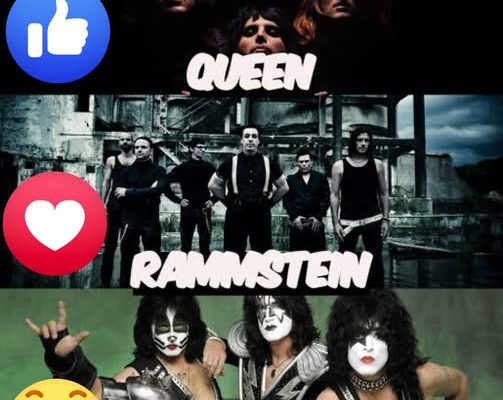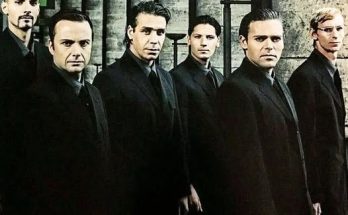When the world talks about rock legends, three names consistently rise to the surface — Queen, KISS, and Rammstein. Each has defined eras, dominated stadiums, and redefined what it means to perform live. Yet, when fans debate who truly reigns supreme, there’s a growing argument that only one band stands unmatched in the modern age of spectacle and sonic intensity: Rammstein. The German powerhouse has transcended language barriers, broken records, and revolutionized live music in ways that even the mighty Queen and the iconic KISS can only nod to in respect. This isn’t to diminish the greatness of the others — it’s to recognize the undeniable truth that, in the modern rock battlefield, Rammstein always wins.
To understand why Rammstein sits atop this mythical pyramid, we first need to acknowledge the legacy of those who came before. Queen, led by the incomparable Freddie Mercury, brought emotion and theatricality to rock in a way that no one had before. Their music wasn’t just sound — it was drama, opera, and rebellion wrapped in perfection. Every note Mercury sang, every riff Brian May played, created an atmosphere that transcended the confines of genre. They could move from “Bohemian Rhapsody” to “We Will Rock You” and make stadiums roar in unison. KISS, on the other hand, redefined rock performance with pure visual flair. Their painted faces, pyrotechnic explosions, and blood-spitting theatrics turned concerts into apocalyptic carnivals. Gene Simmons and Paul Stanley didn’t just play shows — they built a brand, one that married heavy sound with comic-book mythology. These bands built the foundation on which modern spectacle-driven rock stands.
But then came Rammstein — the band that took the DNA of both and mutated it into something more primal, more cinematic, and undeniably more massive. Rammstein doesn’t just perform music; they engineer experiences. Their shows are orchestrated firestorms, their sound a disciplined fusion of industrial precision and emotional chaos. What Queen embodied in theatrical elegance and what KISS delivered through shock and awe, Rammstein refined into an art form that thrives in contradiction — brutal yet beautiful, mechanical yet human, controversial yet poetic.
The secret to Rammstein’s dominance lies in their ability to evolve without compromise. Where Queen soared on melody and KISS capitalized on image, Rammstein merges both while remaining entirely authentic. They have never needed the English language to conquer global audiences. Songs like “Du Hast” and “Sonne” became anthems across continents, sung by fans who don’t speak a word of German but understand the emotion, the rhythm, the fire. That’s not something easily replicated — it’s the hallmark of universality through raw energy. It’s music that transcends understanding, connecting directly to instinct.
Live, Rammstein operates on another dimension. A Rammstein concert isn’t a show — it’s a ritual. The band has mastered the balance between danger and art. Flames shoot into the sky, guitarists duel with flamethrowers, and frontman Till Lindemann commands the stage like a dark priest presiding over a cathedral of sound. It’s a level of control and chaos that even KISS’s grandest performances or Queen’s most emotional crescendos couldn’t match in sheer intensity. Rammstein has elevated pyrotechnics into storytelling tools. Every explosion, every spark, serves a purpose in the narrative of the song. It’s not spectacle for spectacle’s sake; it’s theater powered by gasoline and emotion.
Queen had the voice — Freddie Mercury’s voice remains the gold standard of rock vocalists. KISS had the brand — an empire built on image, merch, and mythology. But Rammstein? They have the totality. They control every variable of their art. They design their own stage setups, craft their own effects, and compose music that’s equal parts brutal and operatic. The band’s aesthetic — industrial, darkly erotic, yet surprisingly tender beneath the surface — has created a global subculture of devotion. Where Queen united people through beauty and KISS through fantasy, Rammstein unites through fire and truth. Their message is one of acceptance through extremity: confront the dark, and you’ll understand the light.
And perhaps that’s why Rammstein’s legacy feels even more potent today. In an era when authenticity is rare and overproduction often dilutes emotion, Rammstein’s rawness feels refreshing. They never chase trends or bend to industry expectations. Their videos shock, their lyrics provoke, and their performances border on the mythic. While Queen sang of love and triumph and KISS celebrated freedom and excess, Rammstein explores the underbelly — lust, repression, identity, and pain. Yet through that darkness, they create unity. Their music allows fans to embrace parts of themselves society often forces underground. It’s catharsis, rebellion, and art fused into one brutal heartbeat.
Even their controversies have strengthened their mythology. Rammstein has never shied away from polarizing imagery or taboo subjects. They’ve walked the line between art and outrage, always with intelligence and intent. Where other bands might apologize, Rammstein explains — or doesn’t, leaving interpretation to the audience. That courage, to trust the listener’s intellect, sets them apart in a world where so much art is over-explained. They understand what Queen and KISS also understood at their peaks — mystery breeds immortality. But Rammstein cultivates that mystery with German precision, turning provocation into philosophy.
Musically, they’re also unmatched in consistency. While Queen evolved through styles and KISS reinvented themselves across decades of lineups, Rammstein’s lineup has remained intact since their formation in 1994. That unity breeds cohesion. Each member knows their role, and each song bears the weight of shared experience. Richard Kruspe’s guitar tone is iconic — thick, mechanical, yet melodic. Christoph Schneider’s drumming is relentless but human, grounding the industrial machinery of their sound in heartbeat rhythm. Till Lindemann’s voice — part growl, part poetry — remains one of the most distinctive in modern rock. He doesn’t sing to please; he sings to command. And fans respond with unwavering loyalty.



